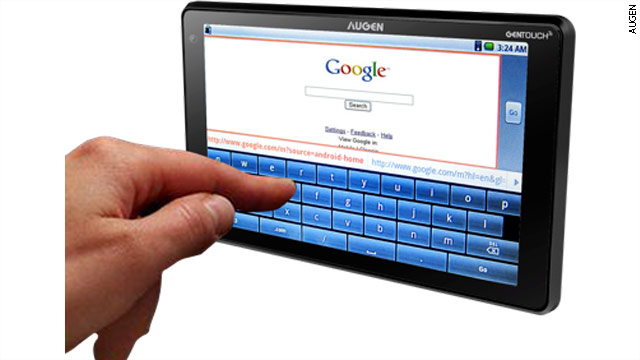
(CNN) -- It's not as fancy as an iPad, but it's far more affordable: Kmart's July 25 circular advertised a 7-inch tablet by Augen running the Android operating system.
The GenTouch78 is on sale through July 31 for $149.99.
That's far less than the cost of a laptop computer, and significantly less than the cost of a typical netbook. It's even less than the up-front cost for many popular carrier-subsidized smartphones -- and it doesn't require a pricey monthly contract.
In fact, this device is roughly the size and cost of the Wi-Fi version of the latest Amazon Kindle. It's small enough to carry in a purse, and light enough to hold up easily if you're lying down in bed to read.
All of this puts the GenTouch78 in a very interesting market position. It's a net-enabled tablet that is truly affordable for a mass consumer audience. In this unboxing video, YouTube user MrJn7 compares the Android tablet to his iPad and notes that while the iPad functions more smoothly and has a more compelling display, you can buy three GenTouch78 tablets (and then some) for the price of the least expensive iPad model.
This tablet certainly has some shortcomings. According to MrJn7's video, the touchscreen is plastic (not glass) and requires a much firmer touch than the iPad. It even comes with a stylus, which seems like a technological throwback.
Furthermore, the Android operating system may not be as intuitive as the Mac OS -- although it probably is not more difficult than Windows, which has been the choice of cost-conscious computer users for decades.
The big deal is: Devices like this -- and rest assured, there will be many more of them -- can help address the class biases of technology and bridge the digital divide.
Tablets like the GenTouch could become popular among people who have never owned a computer, or who own a computer and just want light web access on the go. I could see them becoming popular with teens and students, with seniors (who often feel overwhelmed by learning a computer), or anyone who wants more than an e-reader but less than a netbook as long as it's inexpensive.
I also could see this kind of device catching on among businesses and organizations where people must walk around while recording or accessing information. I could envision cost-conscious shoppers opting to meet their communication needs via a small Wi-Fi tablet plus a no-contract, simple-feature phone -- and not feeling left behind by the smartphone craze.
I'm sure that some people who are accustomed to laptops and smartphones will scoff at the GenTouch78 and its inevitable successors as underpowered cheap toys. That's fine. They're not the target market.
The target market, I think, is people who just want good-enough, easy internet access for the lowest cash outlay. That's a big market -- one that probably includes people who wouldn't ever purchase a computer, netbook, or smartphone.
The catch, of course, is Wi-Fi access -- which is still far from ubiquitous in many areas. It's is often available for free at schools, libraries, and many kinds of businesses; but it's a bigger hurdle for people in rural or poor communities.
So far, tablets (even the iPad) are mainly intended for media consumption, simple interaction, and light content creation or curating. They aren't good for writing a book, manipulating a big spreadsheet or editing a podcast. But they are good enough to allow considerably more people to do considerably more online, affordably, and with fewer obstacles than most phones present.
At the moment, the GenTouch78 is not actually on Kmart's shelves. The retailer is issuing rain checks for this offer. (See the Kmart blog for details.) And it's unknown what Kmart's price for the tablet will be after July 31.
But remember, this particular product is just a starting point. It'll be interesting to watch this market develop -- and to see how people put these cheap tablets to use.